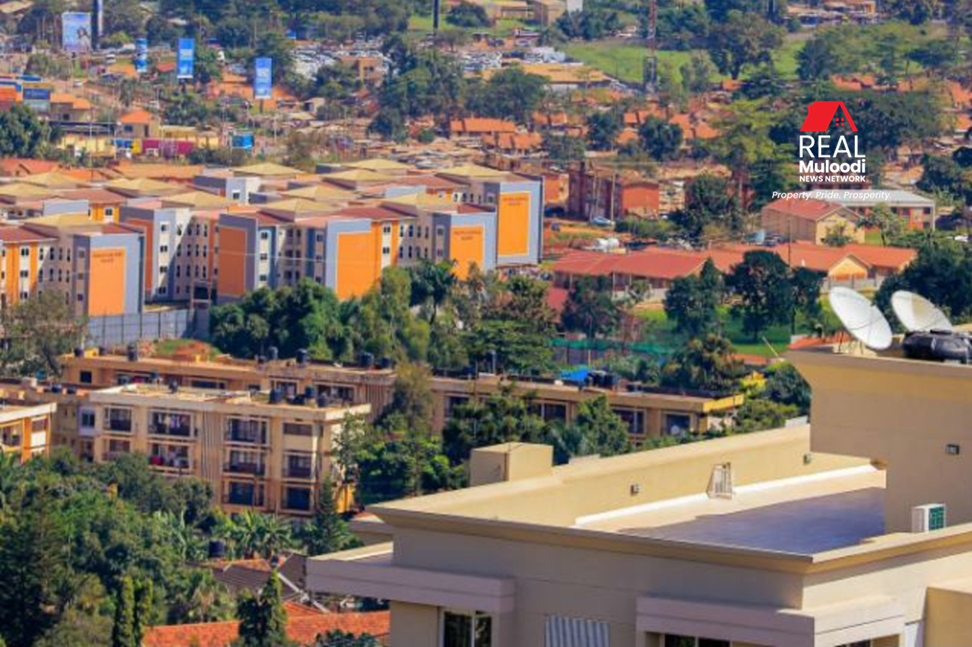UGANDA, Kampala | Real Muloodi News | As a property developer or investor, there are several factors that you should evaluate to determine if a neighbourhood is a good investment opportunity.
Writer Promise Twinamukye recently published an editorial underscoring how important it is to understand dynamics such as past trends, current conditions and future changes as a critical first step in identifying areas that have potential for particular property investments.
For instance, rising home prices in a neighbourhood indicate an up-and-coming area, helping stakeholders determine whether to invest there.
As Uganda rapidly urbanises, neighbourhoods change frequently. Here are some indicators that can help investors evaluate the areas for real estate investment and predict possible changes.
Infrastructure Development
One of the indicators that an area is growing rapidly is the presence of large high-value projects, such as new shopping centres, office structures, villas, or hotels. As an investor, this is the kind of place to keep on the radar.
Public infrastructure, such as schools, hospitals, and highways, also boosts the value of a neighbourhood.
Investors should consider neighbourhoods that have infrastructure development projects that are already in progress or those that have been earmarked for future development.
For instance, the expansion of the Entebbe International Airport in Uganda is expected to increase the demand for property in the surrounding neighbourhoods as it will attract more international businesses and investors.
Also, the completion of the Entebbe Expressway has significantly increased the value of property in the surrounding areas such as Munyonyo and Bunga.
Outdated Structures
Structures deteriorate over time and become obsolete, attracting lower-income occupants. Likewise, dilapidated buildings are a reflection of a neighbourhood in decline. The presence of outdated or unkempt structures is usually an indicator that an area is likely to experience a downward transformation.
However, not all old suburbs are destined to decline. Areas such as Kololo and Muyenga show no signs of losing their popularity or depreciating, indicating that such areas have reached their maturity phase, and little transformation is expected to occur.
Residents’ Socio-economic Status
Knowing who lives in a neighbourhood is essential in evaluating its value. The socio-economic status of residents can greatly impact a neighbourhood’s value.
Households with high and stable incomes, homeowners, and people with advanced levels of formal education may attract more of their kind and elevate the neighborhood. They can influence policies that benefit their communities and attract quality facilities such as schools, hospitals, shopping, and entertainment centres.
On the other hand, if the area is mainly used for commercial purposes, changes in business activity can be an indicator of changes in neighborhood culture.
Demographic of Residents
The demographic of residents, including age and occupation, can also impact neighbourhood value. Younger, childless, well-educated adults tend to prioritise luxury living, and for developers to make a profit on their investment, they should ensure that all facilities cater to these tastes. This can provide insight into the demand for particular properties.
Area’s Trends
Before investing in a neighbourhood, stakeholders need to research and analyse the area’s trends. Understanding past, present, and future trends is crucial for predicting future changes.
Understanding the local economy, will help investors identify areas where the economy is growing, and this can be an indicator of where investment opportunities exist. Consider the economic indicators of the neighbourhood, such as the median income, unemployment rate, and job growth.
They should also research property prices and rental rates in the neighbourhood. This information can help them determine the value of the properties in the neighbourhood and whether they are overpriced or underpriced.
Analysing transportation is also essential because easy access to public transport can influence a neighbourhood’s value.
Proximity to Amenities
Proximity to amenities like shopping centres, hospitals, schools, and recreational areas is a critical consideration when evaluating an area for investment. An area with good access to such amenities is likely to attract more buyers and tenants.
For example, properties in suburbs such as Muyenga, Kololo, and Naguru that are in proximity to international schools, health centres, and diplomatic missions are more expensive because of the convenience and ease of access to services.
Besides, a property in a neighbourhood with a good road network, access to public transport, and essential services such as water and electricity is more attractive to buyers and tenants.
Security
Insecurity can significantly impact the value of property in an area. A neighbourhood that is notorious for criminal activities such as theft, burglary, or violence is likely to have low demand for property.
Areas such as Kisenyi in Kampala city, which is known for high crime rates, have significantly lower property values than other neighbourhoods that have a better reputation in terms of security.
Zoning Regulations
It is essential to understand the zoning regulations in an area before investing in property. Zoning refers to the division of land into areas that are designated for a particular use, such as commercial, residential, or industrial use.
Investors should consider neighbourhoods that have clear zoning regulations to ensure that the area retains its value in the long term. For example, a residential neighbourhood that is zoned for commercial use may not be suitable for families in the long term.
Summing Up
By evaluating these factors, you can determine whether a neighbourhood is a good investment opportunity for a property developer. It’s important to conduct thorough research and analysis before investing in any property to ensure you are making a sound investment decision.
READ MORE LIKE THIS:



